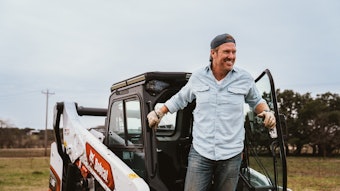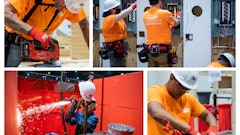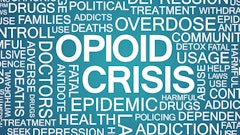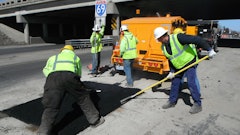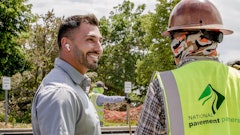
The President of the Iron Workers District Council of New England, Shawn Nehiley, introduced me to several key leaders from New England on the topics of addiction treatment and recovery, opioid risk reduction, and overdose prevention. Through him, I met three leaders who embraced me as a fellow ally, collaborator, and friend:
- Michael Doucette, Financial Secretary-Treasurer of Ironworkers Local #7 in Boston
- Tom Gunning, Executive Director of the Building Trades Employers Association (BTEA) Northeast
- Dave Argus, Operations Director of the Contract Division of Karas & Karas Glass, a glazing contractor in South Boston
Since 2020, I’ve enjoyed partnering on presentations, webinars, and articles with one or more of these leaders for various organizations, including the Ironworkers Management Progressive Action Cooperative Trust (IMPACT), Construction Users Round Table (CURT), Associated General Contractors of America (ACG), Construction Financial Management Association (CFMA), and the Building Enclosure Conference of the National Glass Association (NGA).
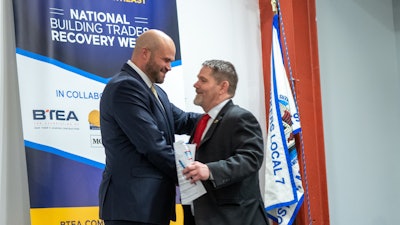 Tom Gunning introduces Shawn Nehiley as part of the 2nd Annual BTEA Building Trades Recovery Week Opening Night at the Iron Workers Local 7 Union Hall.Sacks Communications
Tom Gunning introduces Shawn Nehiley as part of the 2nd Annual BTEA Building Trades Recovery Week Opening Night at the Iron Workers Local 7 Union Hall.Sacks Communications
Definition & Framework for Recovery
The Substance Abuse Mental Health Services Administration (SAMHSA) developed a “working definition” and a framework for recovery. SAMHSA defines recovery “as a process of change through which individuals improve their health and wellness, live self-directed lives, and strive to reach their full potential”. SAMHSA’s framework for recovery “signals a dramatic shift in the expectation for positive outcomes for individuals who experience mental and substance use conditions or the co-occurring of the two”.
Recovery Week was officially launched in April 2019 by the stakeholders of the BTEA to shine light on the challenges of substance use disorder in the construction industry. Recovery Week has been an annual event every year since. Although the pandemic kept the event from being held in person in 2020, recovery resources were made available to employers and local labor leaders to share with workers and families seeking support for substance use disorder treatment and recovery.
BTEA Northeast currently operates in all seven New England States and portions of upstate New York. BTEA Northeast and BTEA New York (two separate entities) collaborated on Building Trades Recovery Week and SafeBuild in 2022. In 2023, more than 1,500 individuals participated in Recovery Week events from Opening Night to educational sessions to stand-downs in both Massachusetts and Rhode Island.
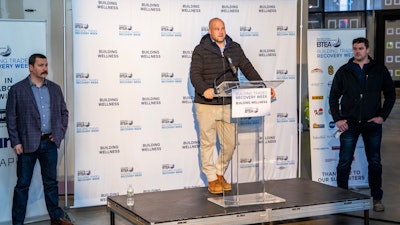 Tom Gunning addresses the crowd at the 3rd Annual BTEA Building Trades Recovery Week Stand Down at the L4 & L5 Project in Boston’s Seaport District led by WS Development, Suffolk and Turner.617Media
Tom Gunning addresses the crowd at the 3rd Annual BTEA Building Trades Recovery Week Stand Down at the L4 & L5 Project in Boston’s Seaport District led by WS Development, Suffolk and Turner.617Media
Thomas S. Gunning, Executive Director of the BTEA, Northeast
Tom Gunning identifies as a person in long-term recovery. Building Trades Recovery Week is personal for him: “Personally, I just want to give back (the recovery that) was freely given to me”. Gunning states “I can’t keep what God has granted me – I need to give it away to others who are out there suffering from what I suffered from”.
Gunning understands how harmful judgement is to people considering starting or maintaining a recovery journey. Gunning sees Recovery Week as a way to show others that support exists for those who are ready to seek help. Recovery Week is intentionally created to be a stigma-free zone where everyone is welcome to listen, lean in, and learn about substance use disorder treatment and recovery. 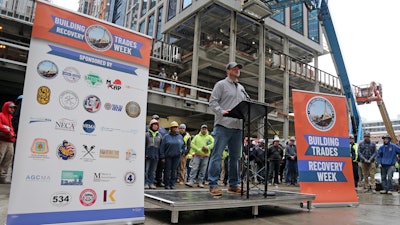 Tom Gunning addresses the crowd at the 1st Annual BTEA Building Trades Recovery Week Stand Down at the M Block Stand Down in Boston, Massachusetts.617Media
Tom Gunning addresses the crowd at the 1st Annual BTEA Building Trades Recovery Week Stand Down at the M Block Stand Down in Boston, Massachusetts.617Media
Gunning knows how real the struggle is with mental health and addiction. “The union construction industry is made up of the most talented and hardworking individuals”, Gunning says “but the statistics surrounding SUD and mental health are not in our favor for a variety of reasons, most specifically given the demands of our job”. Gunning is intentional about wanting to provide hope to “all union brothers and sisters to know that as contractors, we are here to help get you the help you need so we can get you back to work when it is safe to do so”.
Gunning is proud to be at the helm of a forward-thinking organization leading the way for employers to be more supportive of employees and families facing the challenges of substance use disorder. Gunning proclaims that “Recovery Week has evolved to focus on both substance use disorder and mental wellness because both are challenges currently affecting our industry at disproportionate levels”.
Gunning describes the success of Recovery Week is how it is a “true industrywide team effort”. Gunning acknowledges many stakeholders and supporters of Recovery Week, including “14 trade associations and 15 unions encompassed in the Massachusetts Building Trades. Building Trades Union”. Moreover, Gunning lauds the “more than 40 sponsors that pledge support annually across trade associations, unions, BTEA member companies, health/wellness companies, and construction vendors and suppliers”.
Another success that Gunning mentions boldly is how the stakeholders “jointly agreed to put Narcan (naloxone) on all our jobsites and trained leaders on administering the drug. All told, more than 500 Narcan units have been purchased and distributed to member contractors and their jobsites.”
Gunning acknowledges that “contractors employ thousands of union construction workers throughout the Northeast. Our contractor members and our building trade union partners have aligned on numerous goals but one in particular stands out, saving lives” Gunning states these partners collectively hired Employee Assistance Programs and continue to try to remove the stigma and fear of coming forward to get help, no matter what your role is in the industry”.
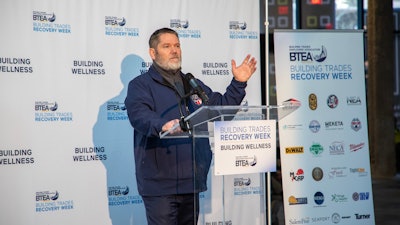 Shawn Nehiley addresses union brothers and sisters at the 3rd Annual BTEA Building Trades Recovery Week Stand Down at the L4 & L5 Project in Boston’s Seaport District led by WS Development, Suffolk and Turner.617Media
Shawn Nehiley addresses union brothers and sisters at the 3rd Annual BTEA Building Trades Recovery Week Stand Down at the L4 & L5 Project in Boston’s Seaport District led by WS Development, Suffolk and Turner.617Media
Shawn Nehiley, President, Iron Workers District Council of New England
Shawn Nehiley also identifies with being a person in long-term recovery. Nehiley has been breaking down barriers to help facilitate recovery support services for ironworkers and trades workers from other unions. Nehiley was instrumental in bringing a 12-step recovery program to his union hall and for helping to pave the way for naloxone on jobsites.
Nehiley is a passionate advocate for Recovery Week. Nehiley openly shares his recovery journey as he knows the danger of secrets. Nehiley also speaks out to break down stigma by modeling transparency and vulnerability to empower others to seek help and healing. 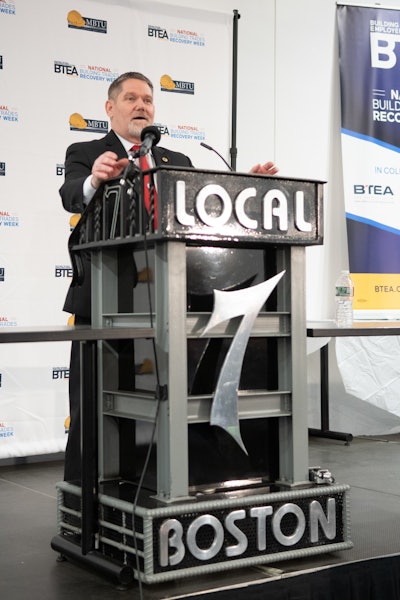 Shawn Nehiley addresses the crowd at the 2nd Annual BTEA Building Trades Recovery Week Opening Night at the Iron Workers Local 7 Union Hall.Sacks Communications
Shawn Nehiley addresses the crowd at the 2nd Annual BTEA Building Trades Recovery Week Opening Night at the Iron Workers Local 7 Union Hall.Sacks Communications
As someone who struggled with addiction Recovery Week shows me how far we have come in the last thirteen years of my recovery”. Recovery Week brings like-minded people in recovery together to share our experience and educate industry partners on ways to help their members and employees”. Instead of sending the message that mental health and substance use are something that should remain in the shadows, it sends the message that these issues should be brought to light.
Nehiley says the power of the dedicated Recovery Week is how “it puts a human face on mental health, substance use issues. The personal stories let others know they are not alone and that reaching out for help is not a weakness but a strength”. Another message of Recovery Week is the unity between labor and management. Adding, “When the unions and contractors have the same constant and consistent message it allows those struggling to seek help without fear of reprisal. It sends the message that it’s okay to seek help!"
While progress has been made in breaking down stigma, Nehiley is realistic that barriers still exist in understanding and accepting addiction as a disease. He says “education overcomes stigma and outdated thinking by sharing available resources and how to access them”. Anyone who thinks mental health and substance use issues are a moral issue are educated that these issues are much more complex than that” . Nehiley exclaims, “if one person’s mind is changed on how they see these issues or one person seeks help then Recovery Week is a success”!
Nehiley finds hope in Recovery Week. Nehiley always remembers those who lost their life to addiction, including chronic health conditions, an overdose, or suicide. His advocacy expanded as he “got tired of attending wakes, funerals and memorial services for friends and coworkers”. He feels the dedicated week could have helped those we have already lost and that it has already saved lives in three ways:
- Helping people know they have the ability to change one person’s life by reaching to give a hand-up or at least pointing people that have issues in the right direction.
- Reinforcing that one act of kindness may help a person in need not feel so alone by allowing people to see someone struggling as a person and that the issues they face can be overcome.
- Giving people in attendance that may be struggling themselves or supporting a person struggling the courage to reach out for the help they need.
The inaugural Recovery Week signaled a turning point in bringing addiction out of the shadows and into the open. Recovery Week provides an opportunity for educating, equipping, and empowering leaders, managers/supervisors, and workers alike to learn about recovery resources and how to share them with people in need. As the outreach expands and the participation grows so do the stories of hope and healing that are occurring. Recovery Week is making a difference in the construction industry throughout New England. Let’s all unite and bring recovery awareness to our respective corners of the industry. 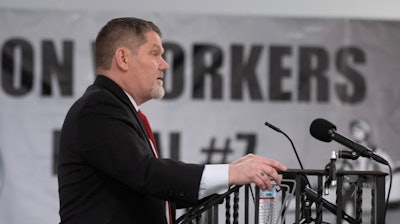 Shawn Nehiley, President, Iron Workers District Council of New EnglandIron Workers International
Shawn Nehiley, President, Iron Workers District Council of New EnglandIron Workers International
The Massachusetts Building Trades Union (MBTU) is a major partner in the annual Recovery Week activities. The MBTU and its member unions posted recovery resources on its website to destigmatize and promote weekly recovery meetings.
The cover story of the August 2, 2021, issue of Engineering-News Record featured Nehiley, Gunning, and Argus and other construction leaders discussing mental health, addiction treatment and recovery. Argus and Gunning were recognized by Engineering News-Record as a Top 25 Newsmaker for 2021 and 2022, respectively, for their work on battling addiction in the construction industry. Doucette, Gunning, Argus, and I always highlight Nehiley’s “boots on the ground” advocacy and servant leadership to help people in need. We refer to Nehiley as an “unsung hero” in this cause.
Additional recovery resources:
Building Support for Workers Through Recovery-Friendly Workplaces [Construction Financial Management Association (CFMA)] Nov/Dec 2022
United States Department of Labor (USDOL) Recovery-Ready Workplace Toolkit - Guidance and Resources for Private and Public Sector Employers. Nov 2023
